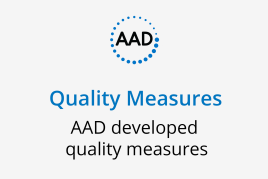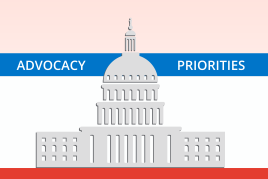Young Investigator Awards
The AAD Young Investigator Awards are given annually by the Academy to young dermatology researchers in the United States and Canada who demonstrate the potential to become established, independently funded investigators in the field. The purpose of the award is to recognize significant research advances in the science and practice of dermatology.
Award:
The award has three tracks, one for basic/translational research, another for clinical research, and a third for applicants underrepresented in medicine (URiM) or research focused on underserved populations. One recipient from each track will receive a $6,000 prize and an engraved plaque during the Academy’s Annual Meeting.
Criteria:
The applicants must have a DO, MD, or MD/PhD degree, and have completed or be participating in a dermatology residency program in the U.S. or Canada accredited by:
The ACGME,
The Royal College of Physicians and Surgeons of Canada; or
The Professional Corporation of Physicians of Quebec.
MD and DO applicants must have initiated the research after medical school, and applicants with a PhD must have initiated the research after their PhD thesis work.
The research submitted must be completed; proposals or research in progress are not eligible.
Applicants must complete their research by age 40 and within eight years of completing a terminal degree.
An extension of up to two years may be granted for personal or family medical issues or the birth, adoption, or rearing of a child or children.
The submitted research must also be submitted for publication, in press, or published.
For the URiM track, the research should be conducted by a researcher who is a member of a URiM population or by an individual whose research concerns health issues that notably affect an underserved community. Underrepresented in medicine (URiM) means those racial and ethnic populations that are underrepresented in the medical profession relative to their numbers in the general population.
The application period runs from June 17 to Sept. 15. Individuals from diverse backgrounds are strongly encouraged to apply, as are individuals whose submitted research examines underrepresented minority and diverse populations.
The applicant must personally complete all sections of the application except the letter of recommendation
Narrative description of the applicant's major contribution to science as designated for this application. The description should include the following as they relate to the major contribution to science theme: background and significance of the scientific question(s); objectives, methods, results, conclusions, and benefits to dermatology of each study (if multiple studies) comprising the body of research; overall value of the research contributions to dermatology; future directions of research; and appropriate reference list.
CV should include publication history, scientific presentations, research achievements, and prior recognition of work (awards and funding)
One additional letter of recommendation may be submitted as a supplemental attachment
Additional material related to the submitted research may be submitted as a supplemental attachment, including (if applicable) a letter from the applicant attesting to the reason(s) for a time extension for submitted research
The awards selection panel includes representatives from the Council on Science and Research, the editorial board of the Journal of the American Academy of Dermatology, the Association of Professors of Dermatology, the Society for Investigative Dermatology, an AAD member-at-large, and a resident in dermatology or past winner.
Nominees will be judged on the following criteria:
Originality of research concept
Soundness of research design
Quality/clarity of the narrative research description
Perceived value of the research to dermatology
Quality and strength of publications
Overall assessment of applicant
a. Likelihood of becoming an established, independently-funded investigator in dermatology
b. Quality and strength of research achievements
c. Prior recognition of work (awards and funding)
Recent awardees have a track record of scholarship reflected by publications in clinical and research-focused journals, presentations at academic meetings, and application for research grants. Most have received independent or mentored research funding in the form of career development or other awards. Successful applicants have developed research programs which poise the investigator to become an independent leader in the field. In addition, they have pursued ongoing investigations in the same or related/complementary areas of dermatology.
If external collaborators or sources of external funding represent any perceived or actual conflict of interest with the AAD and its mission, the AAD reserves the right to exclude the applicant from consideration.
2024
Basic/Translational Research Award
Alicia J. Little, MD, PhD, FAAD
Clinical Research Award
Mackenzie Wehner, MD, FAAD
URiM/Underserved Population Research Award
Roxana Daneshjou, MD, PhD, FAAD
2023
Basic/Translational Research Award
Andrew Ji, MD, FAAD
Clinical Research Award
Aileen Chang, MD, FAAD
2022
Basic/Translational Research Award
Sherrie Divito, MD, PhD, FAAD
Shawn Kwatra, MD, FAAD
Clinical Research Award
John Barbieri, MD, MBA, FAAD
2021
Basic/Translational Research Award
Allison Billi, MD, PhD
Clinical Research Award
Joy Wan, MD, MSCE
2020
Basic/Translational Research Award
William Damsky, MD, PhD
Clinical Research Award
Aaron Drucker, MD, ScM
2019
Basic/Translational Research Award
Tamia Harris-Tryon, MD, PhD
Clinical Research Award
Katrina Abuabara, MD, MA, MSCE
2018
Basic/Translational Research Award
Brian Capell, MD, PhD
Sarina Elmariah, MD, PhD
Clinical Research Award
Junko Takeshita, MD, PhD
2017
Christopher Bunick, MD, PhD
Oscar Colegio, MD, PhD
2016
Tiffany Scharschmidt, MD
Jaehyak Choi, MD, PhD
2015
John Harris, MD, PhD
Ali Jabbari, MD, PhD
2014
Thomas Leung, MD, PhD
Brian Kim, MD
2013
Shadmehr "Shawn" Demehri, MD, PhD
Richard Wang, MD, PhD
2012
Raymond Cho, MD, PhD
Niroshana Anandasabapathy, MD, PhD
2011
Keith Choate, MD, PhD
Emma Guttman, MD, PhD
2010
Kevin Wang, MD, PhD
2009
Emanual Maverakis, MD
2008
David Wong, MD, PhD
Lu Le, M.D., PhD
Kurt Lu, MD
2007
Johann Eli Gudjonsson, MD, PhD
Julie V. Schaffer, MD, FAAD
2006
Aimee S. Payne, MD
David H. Chu, MD, PhD
2005
Luis A. Garza, MD, PhD
David J. Kouba, MD
2004
Rochelle Mandelcorn-Monson, MD
Jennifer T. Trent, MD
 Find a Dermatologist
Find a Dermatologist
 Member directory
Member directory
 AAD Learning Center
AAD Learning Center
 2025 AAD Innovation Academy
2025 AAD Innovation Academy
 Need coding help?
Need coding help?
 Reduce burdens
Reduce burdens
 Clinical guidelines
Clinical guidelines
 Why use AAD measures?
Why use AAD measures?
 Latest news
Latest news
 New insights
New insights
 Physician wellness
Physician wellness
 Joining or selling a practice?
Joining or selling a practice?
 Promote the specialty
Promote the specialty
 Advocacy priorities
Advocacy priorities
